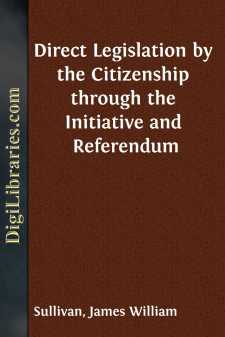Categories
- Antiques & Collectibles 13
- Architecture 36
- Art 48
- Bibles 22
- Biography & Autobiography 813
- Body, Mind & Spirit 142
- Business & Economics 28
- Children's Books 14
- Children's Fiction 11
- Computers 4
- Cooking 94
- Crafts & Hobbies 4
- Drama 346
- Education 46
- Family & Relationships 57
- Fiction 11829
- Games 19
- Gardening 17
- Health & Fitness 34
- History 1377
- House & Home 1
- Humor 147
- Juvenile Fiction 1873
- Juvenile Nonfiction 202
- Language Arts & Disciplines 88
- Law 16
- Literary Collections 686
- Literary Criticism 179
- Mathematics 13
- Medical 41
- Music 40
- Nature 179
- Non-Classifiable 1768
- Performing Arts 7
- Periodicals 1453
- Philosophy 64
- Photography 2
- Poetry 896
- Political Science 203
- Psychology 42
- Reference 154
- Religion 513
- Science 126
- Self-Help 84
- Social Science 81
- Sports & Recreation 34
- Study Aids 3
- Technology & Engineering 59
- Transportation 23
- Travel 463
- True Crime 29
Direct Legislation by the Citizenship through the Initiative and Referendum
Categories:
Description:
Excerpt
THE INITIATIVE AND REFERENDUM IN SWITZERLAND.
Democratic versus Representative Government.
There is a radical difference between a democracy and a representative government. In a democracy, the citizens themselves make the law and superintend its administration; in a representative government, the citizens empower legislators and executive officers to make the law and to carry it out. Under a democracy, sovereignty remains uninterruptedly with the citizens, or rather a changing majority of the citizens; under a representative government, sovereignty is surrendered by the citizens, for stated terms, to officials. In other words, democracy is direct rule by the majority, while representative government is rule by a succession of quasi-oligarchies, indirectly and remotely responsible to the majority.
Observe, now, first, the influences that chiefly contribute to make government in the United States what it is:—
The county, state, and federal governments are not democracies. In form, they are quasi-oligarchies composed of representatives and executives; but in fact they are frequently complete oligarchies, composed in part of unending rings of politicians that directly control the law and the offices, and in part of the permanent plutocracy, who purchase legislation through the politicians.
Observe, next, certain strong influences for the better that obtain in a pure democracy:—
An obvious influence is, in one respect, the same as that which enriches the plutocrat and prompts the politician to reach for power—self-interest. When all the members of any body of men find themselves in equal relation to a profitable end in which they solely are concerned, they will surely be inclined to assert their joint independence of other bodies in that respect, and, further, each member will claim his full share of whatever benefits arise. But, more than that; something like equality of benefits being achieved, perhaps through various agencies of force, a second influence will be brought powerfully to bear on those concerned. It is that of justice. Fair play to all the members will be generally demanded.
In a pure democracy, therefore, intelligently controlled self-interest and a consequent sentiment of justice are the sources in which the highest possible social benefits may be expected to begin.
The reader has now before him the political principle to be here maintained—pure democracy as distinguished from representative government. My argument, then, becomes this: To show that, by means of the one lawmaking method to which pure democracy is restricted,—that of direct legislation by the citizenship,—the political "ring," "boss," and "heeler" may be abolished, the American plutocracy destroyed, and government simplified and reduced to the limits set by the conscience of the majority as affected by social necessities. My task involves proof that direct legislation is possible with large communities.
Direct Legislation in Switzerland.
Evidence as to the practicability and the effects of direct legislation is afforded by Switzerland, especially in its history during the past twenty-five years. To this evidence I turn at once.
There are in Switzerland twenty-two cantons (states), which are subdivided into 2,706 communes (townships). The commune is the political as well as territorial unit. Commonly, as nearly as consistent with cantonal and federal rights, in local affairs the commune governs itself. Its citizens regard it as their smaller state. It is jealous of interference by the greater state. It has its own property to look after. Until the interests of the canton or the Confederation manifestly replace those of the immediate locality, the commune declines to part with the administration of its lands, forests, police, roads, schools, churches, or taxes.
In German Switzerland the adult male inhabitants of the commune meet at least once annually, usually in the town market place or on a mountain plain, and carry out their functions as citizens. There they debate proposed laws, name officers, and discuss affairs of a public nature. On such occasions, every citizen is a legislator, his voice and vote influencing the questions at issue. The right of initiating a measure belongs to each....


